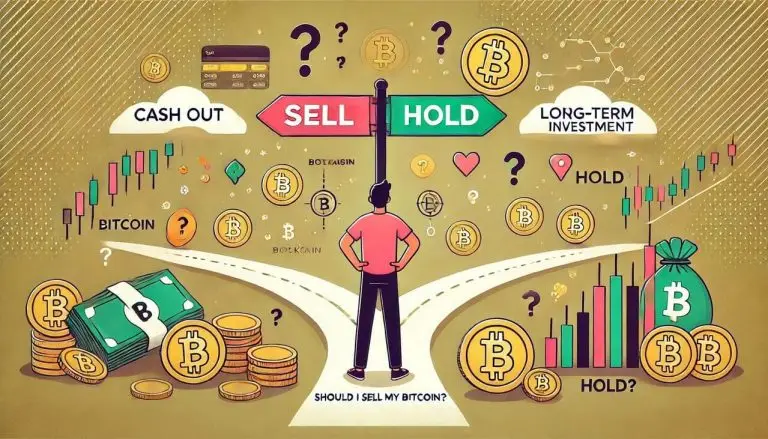Bitcoin has become one of the most popular investment assets, but deciding when to sell can be challenging, especially in a volatile market. Many traders fall into the trap of selling too early out of fear or holding too long due to greed. If you’re wondering, “Should I sell my Bitcoin?”, this guide will help you make an informed decision while avoiding emotional pitfalls like FOMO (Fear of Missing Out) and panic selling.
Key Insights
- Decide whether you’re holding Bitcoin for long-term gains, short-term trading, or portfolio diversification. Your investment objective will guide when to sell.
- Rely on key indicators like RSI (above 70 signals overbought), moving averages, and on-chain metrics to identify ideal selling opportunities.
- Stick to your trading plan, avoid hype-driven decisions, and use trailing stop-loss orders to protect profits while allowing further growth.
- If Bitcoin surpasses your target portfolio allocation, sell some to rebalance. Also, factor in tax implications, as short-term gains incur higher taxes than long-term gains.
1. Understand Your Investment Goal
Before deciding whether to sell your Bitcoin, clarify your investment objective. Are you holding Bitcoin for the long term, trading for short-term gains, or using it to diversify your portfolio? Your answer will determine when to sell.
- Long-Term Holders (HODLers): Consider selling only when Bitcoin reaches your target price or if you need funds for a specific purpose.
- Short-Term Traders: Sell when technical indicators suggest an overbought condition or if the price hits your stop-loss level.
- Portfolio Diversification: Sell if Bitcoin’s value exceeds your desired portfolio allocation.
Tip: Write down your investment goal to avoid impulsive decisions.
2. Look for Key Market Indicators
Selling Bitcoin based on emotions can lead to losses. Instead, rely on market indicators to identify optimal selling opportunities:
- Relative Strength Index (RSI): An RSI above 70 indicates an overbought market, suggesting it might be time to sell.
- Moving Averages: If Bitcoin’s price falls below the 50-day or 200-day moving average, it may signal a downtrend.
- On-Chain Metrics: Look at metrics like Bitcoin’s “Spent Output Profit Ratio” (SOPR) to gauge whether holders are selling at a profit.
Tip: Use platforms like Coinrule to automate your trades based on these indicators, reducing emotional decision-making.
3. Avoid FOMO: Don’t Chase the Hype
One of the most common mistakes traders make is selling too early during price dips or buying during surges out of FOMO. Remember, Bitcoin’s price can be highly volatile.
How to avoid FOMO:
- Stick to your trading plan and exit strategy.
- Avoid social media-driven hype.
- Set realistic profit targets and automate trades when they are reached.
Tip: Use a trailing stop-loss order to protect profits while giving room for further gains.
4. Avoid Panic Selling During Market Dips
Market dips are common in the crypto world, but selling in panic often leads to regret when prices recover. Instead of selling in fear, analyze the situation:
- Is the dip driven by short-term news, or is there a fundamental issue with Bitcoin?
- Are institutional investors still holding?
- Is the price above your original purchase level?
Tip: Use stop-loss orders to minimize losses without emotional selling.
5. Rebalance Your Portfolio Regularly
If Bitcoin’s value has grown significantly and now represents a large portion of your portfolio, it might be wise to sell some and rebalance your investments. This helps reduce risk while locking in profits.
Example: If Bitcoin now makes up 50% of your portfolio, but your target was 30%, consider selling 20% and diversifying into other assets.
Tip: Schedule quarterly portfolio reviews to adjust your holdings.
6. Consider Tax Implications Before Selling
Selling Bitcoin can trigger capital gains taxes, depending on how long you’ve held the asset and your country’s tax laws. Understanding the tax impact can help you decide whether selling now is the right choice.
Key Points to Know:
- Short-term gains: Higher taxes if you sell within a year of purchase.
- Long-term gains: Lower tax rates if you hold for over a year.
- Tax-Loss Harvesting: If Bitcoin’s price drops below your purchase price, selling can offset other capital gains.
Tip: Consult with a tax advisor to minimize liabilities.
7. Stick to Your Exit Strategy
The best way to avoid emotional decisions is to set an exit strategy when you first invest. This includes:
- Profit Targets: Set specific price levels to sell portions of your holdings (e.g., 25% at $50,000, another 25% at $60,000).
- Stop-Loss Orders: Automatically sell if Bitcoin falls below a certain price.
- Dollar-Cost Averaging (DCA): Sell gradually, just like you might buy gradually.
Tip: Platforms like Coinrule let you automate exit strategies, ensuring disciplined trading.
8. Should I Sell My Bitcoin Now?
To answer the question, “Should I sell my Bitcoin?”, consider the following:
Sell if:
- You’ve reached your profit target.
- Bitcoin exceeds your portfolio allocation.
- You need funds for other priorities.
- Technical indicators suggest an overbought market.
Hold if:
- You believe in Bitcoin’s long-term growth.
- The market dip is driven by short-term news.
- Your investment plan supports long-term holding.
Conclusion: Sell Smart, Avoid Emotions
Deciding when to sell Bitcoin requires a balance between strategy and emotional control. By setting clear goals, relying on technical indicators, and avoiding FOMO or panic selling, you can make confident decisions that align with your financial goals.
Remember: The crypto market is volatile, but with a disciplined approach, you can navigate it successfully. If you’re unsure, platforms like Coinrule can help you automate your trades, ensuring you stick to your strategy.
Start trading smarter with Coinrule and take the guesswork out of selling Bitcoin.
Follow Our Official Social Channels:
